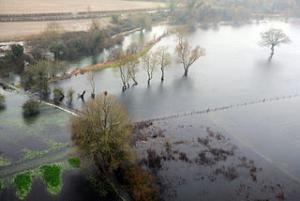Emerging threatsU.K. government rejected flood warnings from own advisers
Critics charge that the U.K. government was warned by both the government’s own climate change experts and outside consultants that there was a need to take urgent action to protect the increasing number areas in Britain which are becoming susceptible to flooding, but that the government rejected the advice. Despite the urging of its own climate experts, the U.K. government in October, just a few weeks before the devastating flooding in Cumbria, decided not to develop comprehensive strategy to address flood risk.

Flooding in Oxfordshire // Source: commons.wikimedia.org
Critics charge that the U.K. government was warned by both the government’s own climate change experts and outside consultants that there was a need to take urgent action to protect the increasing number areas in Britain which are becoming susceptible to flooding, but that the government rejected the advice. The Independent reports that the decision not to develop and implement a comprehensive strategy to tackle to growing risks of flooding was made in October – only a few weeks before the flooding in Cumbria before Christmas and the most recent flooding in Lancashire and Yorkshire.
Chancellor of the Exchequer George Osborne, in the wake of the devastation of the last few days in Cumbria, announced a £50 million repair fund for those whose property had been damaged, but expert note that the cost of clearing up the most recent flooding effecting in both Leeds and York would be much higher.
The Committee on Climate Change (CCC) said that Prime Minister David Cameron’s promised to have a flood strategy developed, but that the government had failed to learn lessons from the widespread flooding in 2013/14.
Six months ago, in June, the CCC issued a report analyzing the progress toward tackling the consequences of climate change, in which it pointedly noted that the government’s most serious failing was the way it had dealt – or, rather, failed to deal – with floods caused by extreme weather.
“Plans and policies, or progress in addressing vulnerabilities, are lacking,” the CCC said.
The CCC recommended that the government should “develop a strategy to address the increasing number of homes in areas of high flood risk.”
In response to the CCC harsh report, the government, in October, replied: “We believe that a strategy to address future residual risk would not be appropriate at this time.”
Daniel Johns, the CCC’s head of adaptation told the Guardian: “The CCC made a very clear recommendation in its statutory advice, but the government rejected it.
“But the government has no strategy to address this residual risk.”
A government spokeswoman told the Independent: “This government has been clear on its commitment to climate change action and we are pushing for an ambitious global deal in Paris as well as driving innovation to build a low-carbon economy. We are also investing £2.3 billion over the next six years to better protect 300,000 homes. The Environment Agency’s figures take account of climate change and show that this investment will reduce flood risk.”
